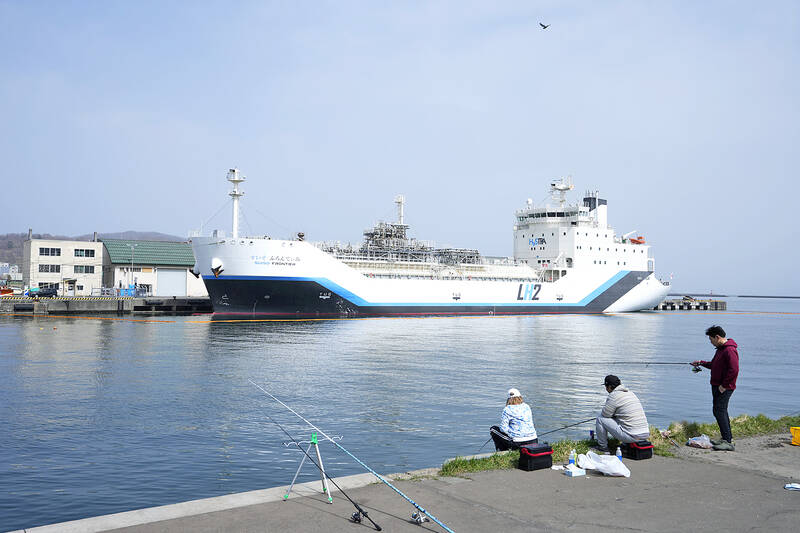The Japanese government yesterday adopted a revision to the country’s plans to use more hydrogen as fuel as part of an effort to reduce carbon emissions.
The plan sets an ambitious target to increase the annual supply by six times the current level to 11 million tonnes by 2040.
It also pledges ¥15 trillion (US$107.73 billion) in funding from private and public sources to build up hydrogen-related supply chains over the next 15 years.

Photo: AP
Japan’s decarbonization strategy centers on using so-called clean coal, hydrogen and nuclear energy to bridge its transition to renewable energy. Russia’s war on Ukraine has deepened concerns over energy security and complicated that effort, but other advanced Western nations are pushing for faster adoption of renewable energy, such as solar, wind and geothermal.
So far, Japan is relying on hydrogen mainly produced using fossil fuels.
Some experts say that strategies such as commercializing the use of hydrogen and ammonia mainly cater to big business interests and major industries that are heavily invested in fossil fuel-based technologies and have influence over government policies.
The revised plan prioritizes nine strategic areas, including development of water electrolysis equipment, fuel storage batteries and large-size tankers for transporting hydrogen.
“Hydrogen is an industrial sector that can make a triple achievement of decarbonization, stable energy supply and economic growth in one shot,” Japanese Chief Cabinet Secretary Hirokazu Matsuno said at the Cabinet meeting yesterday. “We will promote [hydrogen] on a large scale, both demand and supply.”
Japan’s leaders say they want to turn the country into a “hydrogen society,” but the hydrogen industry is still in its initial stages. The government is drafting legislation to support building necessary infrastructure and supply chains for commercial use of pure hydrogen and ammonia, another source of hydrogen.
At a hydrogen council meeting with industrial leaders last week, Japanese Prime Minister Fumio Kishida said that Japan aims to achieve an “Asian zero emission community,” contributing Japanese technology in hydrogen, ammonia and other decarbonization technologies.
“By setting an ambitious goal we aim to make our plans more predictable and encourage long-term investment in developing a large-scale hydrogen supply and demand,” Kishida said.
The Cabinet also approved an annual energy report saying that economic sanctions against Russia for its war on Ukraine have increased long-term competition for liquefied natural gas (LNG), forecasting that shortages could persist through 2025.
European demand for LNG as an alternative to Russian natural gas has pushed LNG prices higher, making it necessary to draw up a long-term strategy for securing stable energy supplies.
Japan adopted a so-called “green transformation” plan in February that calls for promotion of next-generation solar batteries, offshore wind power and renewed use of nuclear energy.

Kehinde Sanni spends his days smoothing out dents and repainting scratched bumpers in a modest autobody shop in Lagos. He has never left Nigeria, yet he speaks glowingly of Burkina Faso military leader Ibrahim Traore. “Nigeria needs someone like Ibrahim Traore of Burkina Faso. He is doing well for his country,” Sanni said. His admiration is shaped by a steady stream of viral videos, memes and social media posts — many misleading or outright false — portraying Traore as a fearless reformer who defied Western powers and reclaimed his country’s dignity. The Burkinabe strongman swept into power following a coup in September 2022

‘FRAGMENTING’: British politics have for a long time been dominated by the Labor Party and the Tories, but polls suggest that Reform now poses a significant challenge Hard-right upstarts Reform UK snatched a parliamentary seat from British Prime Minister Keir Starmer’s Labor Party yesterday in local elections that dealt a blow to the UK’s two establishment parties. Reform, led by anti-immigrant firebrand Nigel Farage, won the by-election in Runcorn and Helsby in northwest England by just six votes, as it picked up gains in other localities, including one mayoralty. The group’s strong showing continues momentum it built up at last year’s general election and appears to confirm a trend that the UK is entering an era of multi-party politics. “For the movement, for the party it’s a very, very big

ENTERTAINMENT: Rio officials have a history of organizing massive concerts on Copacabana Beach, with Madonna’s show drawing about 1.6 million fans last year Lady Gaga on Saturday night gave a free concert in front of 2 million fans who poured onto Copacabana Beach in Rio de Janeiro for the biggest show of her career. “Tonight, we’re making history... Thank you for making history with me,” Lady Gaga told a screaming crowd. The Mother Monster, as she is known, started the show at about 10:10pm local time with her 2011 song Bloody Mary. Cries of joy rose from the tightly packed fans who sang and danced shoulder-to-shoulder on the vast stretch of sand. Concert organizers said 2.1 million people attended the show. Lady Gaga

SUPPORT: The Australian prime minister promised to back Kyiv against Russia’s invasion, saying: ‘That’s my government’s position. It was yesterday. It still is’ Left-leaning Australian Prime Minister Anthony Albanese yesterday basked in his landslide election win, promising a “disciplined, orderly” government to confront cost-of-living pain and tariff turmoil. People clapped as the 62-year-old and his fiancee, Jodie Haydon, who visited his old inner Sydney haunt, Cafe Italia, surrounded by a crowd of jostling photographers and journalists. Albanese’s Labor Party is on course to win at least 83 seats in the 150-member parliament, partial results showed. Opposition leader Peter Dutton’s conservative Liberal-National coalition had just 38 seats, and other parties 12. Another 17 seats were still in doubt. “We will be a disciplined, orderly